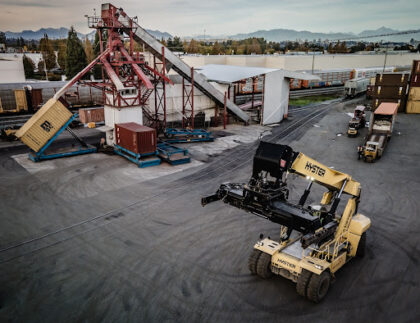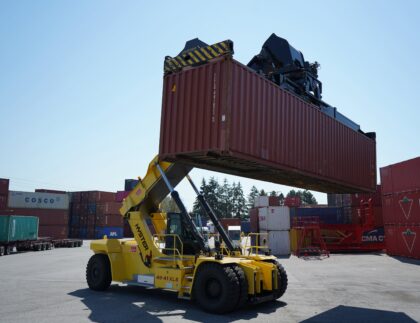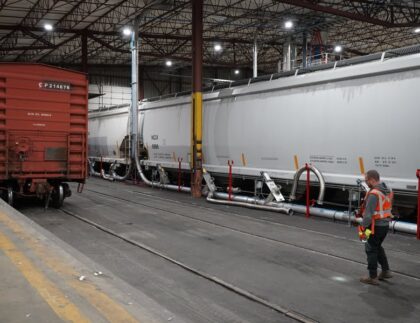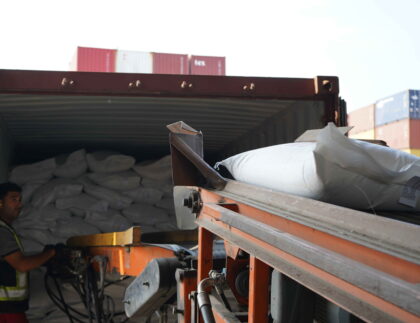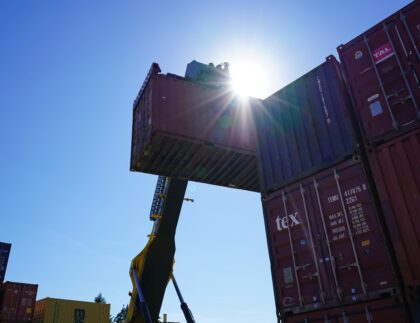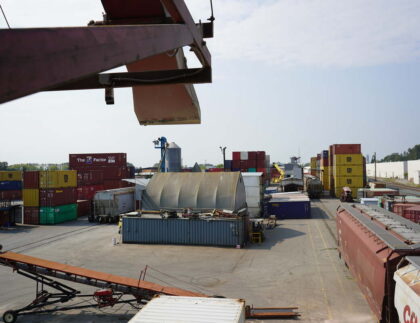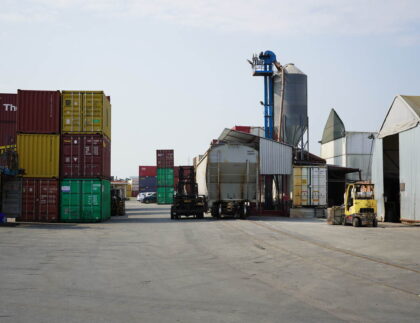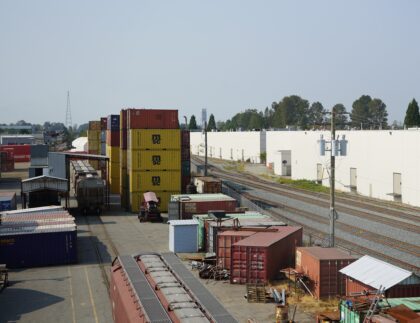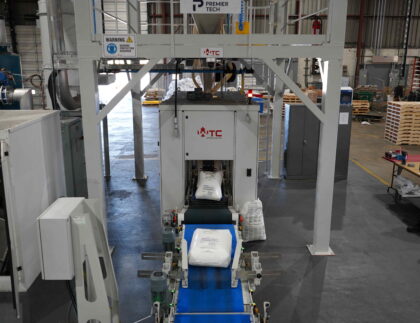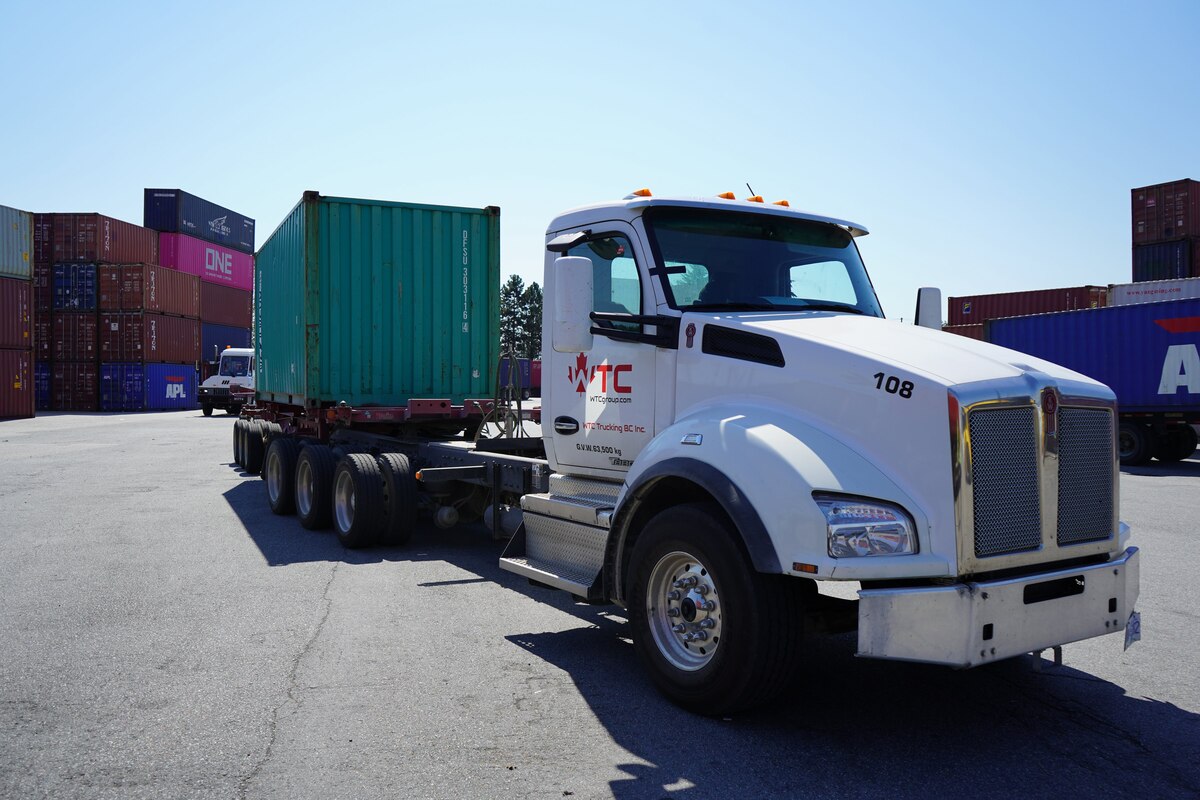
Diesel engines have many advantages over gasoline engines. A diesel engine can handle long distances more efficiently. The engines tend to be more reliable and last longer than gasoline engines. Diesel fuel gets more mileage per gallon. For most people, diesel engines are synonymous with 18-wheeler semi-trucks. Even though diesel is much better than gasoline, according to Pembina, freight transportation is responsible for 10.5% of climate pollution in Canada. Most of those emissions are from heavy-duty trucks. There’s tremendous pressure on Canadian businesses to find ways to reduce their carbon footprint. Petro-Canada introduced EcoDiesel, an alternative fuel for semi-trucks. Learn more about EcoDiesel and how WTC supports its use in the logistics industry.
How Are Biofuels Being Used in the Trucking Industry?
Greenhouse gases have long been a concern around the world for many years. In 2015, The Paris Agreement was adopted by 196 Parties, including Canada, to limit global warming. Canada made a commitment to reduce greenhouse gas (GHG) emissions by 30% below 2005 levels by 2030. The logistics industry significantly impacts the environment by importing and moving goods across countries and exporting products to other countries. Reducing the consumption of fossil fuels is one of the best ways to reduce GHG emissions in transportation.
While many cars are going electric, semi-trucks are switching to biofuels. Many companies are introducing their own brands of biodiesel to the industry, trying to find ways to minimize the impact of semi-trucks on the environment while making biofuels cost-effective for the industry. Petro Canada’s EcoDiesel is a biofuel that offers many advantages.
Sustainability and Green Energy Solutions
Petro-Canada began operating in 1975 after the world’s oil crisis. It was an effort to give Canada more control over the oil industry. Through the years, the company has been a leader in the industry, offering on-site refuelling in 2010 to increase productivity and efficiency for business customers. In 2012, their first DEF (Diesel Exhaust Fluid) pump was installed. Today, Petro-Canada is Canada’s largest on-site DEF network. It’s still owned by Canadians, and their motto is to “Live By the Leaf.” When Petro-Canada merged with Suncor in 2009, sustainability became a core value. The company is trying to find better energy solutions for the future while meeting the needs of today. EcoDiesel is just one of the products they’ve developed to keep logistics moving forward with more sustainability.
What Is EcoDiesel?
EcoDiesel is a fuel product made from 100% renewable materials, like vegetable oils and animal fats. The refining process is called hydrotreating. The food waste is treated with hydrogen under high temperatures and pressure to obtain the final product, which has properties similar to conventional diesel but a lower carbon intensity. Carbon intensity is the amount of carbon dioxide the fuel emits over its life cycle. The lower the carbon intensity number, the lower the emissions. Conventional diesel has a carbon intensity of 94.76, while EcoDiesel has a carbon intensity of 9 to 30. Using EcoDiesel would significantly impact the environment over using conventional diesel fuel.
Switching from conventional diesel to EcoDiesel for 1 million litres is estimated to reduce greenhouse gas emissions by 3,075 tonnes. That’s the equivalent of greenhouse gas emissions of 943 gasoline-powered cars driven over one year! It’s also the amount of CO-2 emissions from 720 homes using energy for one year.
The Benefits of EcoDiesel
Many businesses try to make a difference in the environment, but that isn’t usually what drives most business decisions. Making the switch to EcoDiesel can have other benefits for your business. The environmental impact can be a bonus to your organization.
Easily Streamlined into Your Operations
EcoDiesel works with your current infrastructure without needing modifications to trucks or storage facilities. Many biofuels are challenging to transport because they degrade rubber and other parts of existing systems. Some biofuels require trucks to be fitted with new parts that can withstand the biofuel’s properties. EcoDiesel is a drop-in fuel without overhauls.
Better Performance in Colder Temperatures
One of the biggest problems with biodiesel fuels is that they can gel at colder temperatures. EcoDiesel can be used in temperatures as low as -20C in the winter. It’s a year-round fuel that is suitable for Canadian weather. Even in summer temperatures, the fuel is suitable for use at temperatures as low as -6C.
Higher Cetane Numbers
Cetane measures fuel combustion quality. A higher cetane number means that fuel ignites quickly under pressure in a diesel engine. Semi-trucks do not have spark plugs to combust diesel fuel. Instead, the fuel is put under pressure. Cetane is the chemical compound in diesel fuels that causes it to ignite. Higher cetane numbers relate to higher fuel efficiency, better power, and fewer emissions. Conventional diesel has a cetane rating of 40 or higher. EcoDiesel has a cetane rating of 70 or better.
Interchangeable with Conventional Diesel
EcoDiesel is considered a drop-in fuel, meaning you can switch between conventional diesel and EcoDiesel within the same equipment. It can be added to the same tank as petroleum diesel without mixing. EcoDiesel differs from biodiesel in the way that it is produced. Most truck manufacturers do not recommend more than a 20% biodiesel blend with conventional petroleum diesel. EcoDiesel has an up to 100% blending rate.
Demonstrates a Commitment to Sustainability
Environmental pressures are increasing on businesses, especially those who have government contracts. Using EcoDiesel is a commitment to sustainability, which can make your company more competitive in the industry. Using EcoDiesel shows that you have the plan to reduce your fleet’s carbon footprint. Whether doing business with other shippers or federal, state, and local municipalities, you have concrete data and operations demonstrating an initiative to reduce your emissions.
Why Aren’t Biofuels Being Used More in the Industry?
EcoDiesel has a lot of benefits, but it’s not the standard yet. There are some disadvantages to biofuels in the trucking industry –
- Biodiesel fuels may not be compatible with colder temperatures.
- Biodiesel fuels can have unconverted oils from incomplete processing.
- Trucks and equipment may need retrofitting to be able to use or store biofuels.
- Biodiesels can impact engine warranties.
EcoDiesel addresses many of these disadvantages:
- EcoDiesel is approved for use in colder temperatures than other biodiesels.
- EcoDiesel uses a different type of processing that ensures the renewable materials are fully processed.
- Trucks and equipment do not need significant retrofitting or overhauls.
- EcoDiesel has been approved by most OEMs. It is recommended to check with the manufacturer and a Petro-Canada representative before use.
In Canada, biodiesel fuels are still very expensive compared to conventional petroleum. The logistics industry is just getting on board with biodiesel fuels. Biodiesel fuels are gaining ground, but it takes time for demand to catch up to supply to lower the costs.
In the United States, biodiesel demand increased when the government offered incentives to reduce the costs. The Canadian government announced last June that publishing the final Clean Fuel Regulations (CFR) would create “significant economic opportunities in the development and use of clean fuels and technologies.” As the deadline for the Paris Agreement gets closer, the requirements for trucks to use cleaner fuels will be more stringent. Implementing the use of biodiesel fuels into your fleet now will help your business be more prepared to meet new regulations.
How Is WTC Integrating EcoDiesel into Its Operations?
Sustainability is a big issue in the logistics industry. All carriers are working hard to find ways to be more eco-friendly while remaining cost-effective. Whether you’re looking for transloading services or international shipping, WTC Group is a leader in the industry. We have over 20 years of experience shipping grains and other commodities and have long been a proponent of eco-friendly operations.
Our systems are designed to reduce the environmental impact of our trucks and rails. We have developed transport management software that gives us the most efficient way to get products to market. Many of our partners are also committed to reducing their carbon footprint.
WTC is piloting a program with EcoDiesel to test for future use. We use EcoDiesel in one out of every 20 fill-ups in our trucks. Our system tracks data on EcoDiesel usage to let us provide our partners with information on how using EcoDiesel will impact their bottom line. We aim to find the most cost-effective and sustainable logistics solutions to serve our customers.
The industry is moving towards a more eco-friendly business model. We are leading the way through multiple initiatives within our own business by reducing the number of plastics that escape into the environment, using EcoDiesel within our fleet, and with our in-house software directing shipments. Our motto is “simplifying the movement of goods across the globe through safety, sustainability, and efficiency.” We can get your product to market, whether it’s going across the province or around the globe.
Contact us for more information about our logistics services and our commitment to sustainable business practices, including EcoDiesel.


